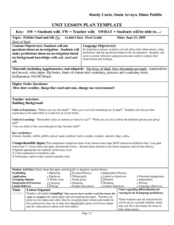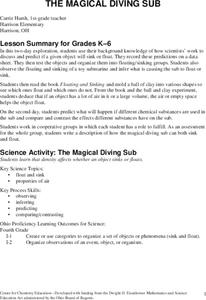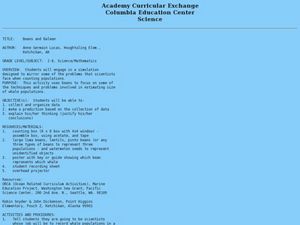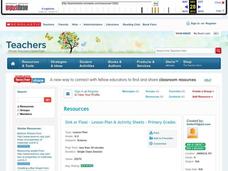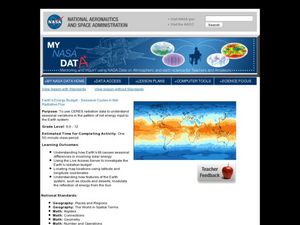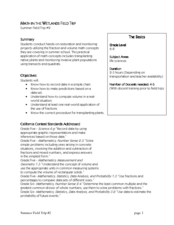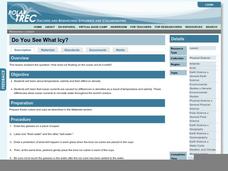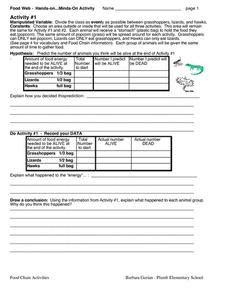Curated OER
Pebbles Sand and Silt
First graders investigate soil, sand and silt. In this environment lesson, 1st graders discuss how changes occur in the environment and the effects of weather. Students perform their own investigation and record their predictions,...
Curated OER
Science: Changes in Matter
Second graders discover what changes occur in various types of matter under different conditions. They make predictions about the changes in an apple left out in the air, water placed in a freezer, and a nail left in a cup of water. They...
Curated OER
Dr. Seuss Science
Students read Bartholomew and the OObleck by Dr. Seuss and experiment with solids and liquids. In this science and reading lesson, students observe and discuss the properties of liquids and solids. Students make predictions of what...
Curated OER
Applied Science - Built Environment (6) Lab
Sixth graders look at toys in space. In this gravity lesson, 6th graders make predictions about what different toys will do with zero gravity. They watch a space video and see what happens to these toys in space.
Curated OER
Capturing Light: The Science of Photography
Students explore light, and how it travels in straight path, recognize that light-sensitive chemical processes can be used to create images using light as catalyst, discover that light can be refracted by convex lens to focus camera,...
Curated OER
Sink or Float
Second graders explore floating and sinking and make predictions about whether certain objects are likely to sink or float. They read the story Who Sank the Boat? by Pamela Allen. Pupils loacate rhyming words and discuss the events of...
Curated OER
The Magical Diving Sub
First graders discuss and predict if a given object sinks or floats. They record their predictions on a data sheet. Pupils test the objects and organize them into floating/sinking groups. Students observe the floating and sinking of a...
Curated OER
Beans and Baleen
Predict whale populations using different beans as whales! Learners observe different types of beans in a dish knowing that each bean represents a different kind of whale. They then predict how many "whales" there are in a certain area....
UAF Geophysical Institute
Observing the Weather
How can you predict the weather without any technology? Young scientists learn to forecast the weather using traditional Native American techniques. Based on their observations of the weather, as well as talking to their classmates, they...
Curated OER
Sink or Float
Using a variety of objects, learners conduct buoyancy experiments. They make predictions on which object will sink or float and test their predictions. They use a graphic organizer to record their findings.
Curated OER
Earth's Energy Budget - Seasonal Cycles in Net Radiative Flux
Learners attempt to understand seasonal variation by viewing images of the energy received by the earth. In this weather activity, students view images from NASA of the influx of energy from the sun and make predictions about resulting...
Curated OER
Weather Lesson Five
Students define a weather forecast, make a forecast using a weather map, identify three prediction guidelines, and explain how computers help to make forecasts. Students make a 24-hour forecast for each of the thirteen states targeted.
Curated OER
Evidence of Evolution by Natural Selection: Testable Hypotheses #2
These slides will activate prior knowledge with real-life examples of natural selection. The predictions and outcomes for those examples are explained. Your students will like the information about the relevant chromosome tests that can...
Curated OER
Homemade Rocks
Student make at least FIVE rocks. They write predictions about that will change and occur. Each student receives a small cup that they label with their name to hold their rocks.
Curated OER
Math in the Wetlands Field Trip
Get your class out in the environment for hands on math activities. In this wetlands lesson, learners transplant native plants, calculate how much soil is needed, and perform math activities based on this experience. They then make...
Curated OER
Tides - The Ins and Outs of Tides
Get your junior oceanographers to generate tidal prediction graphs on an interactive website. They will feel like experts in the field, or shall we say, experts in the ocean! This is a brief, but worthwhile activity that could be used to...
California Academy of Science
What Would Happen?
Nothing says classroom fun like an invertebrate and a magnifying glass! Snails, earthworms, and roly-poly bugs become the center of attention as pint-sized investigators hone their inquiry and observation skills. They are guided through...
Polar Trec
Do You See What Icy?
Here is a lesson that kicks off with a question. "How does ice floating on the ocean act as it melts?" As learners investigate this natural phenomenon, they'll discover that it has a lot to do with temperature, salinity, and the effect...
Curated OER
Climate Change in My City
Students investigate the climate changes occurring locally, regionally and globally over the last one hundred years. They brainstorm and predict whether the current year's weather was warmer or colder than last year then check the...
Curated OER
Food Chain Activities
Transform young biologists into grasshoppers, lizards, and hawks as you teach them about food chains in an interactive life science simulation. Working collaboratively to act out three different scenarios involving these creatures,...
Science Matters
Energy and Winds
In the study of wind energy, scholars build a small windmill and observe how it transfers wind into mechanical energy. Learners will make connections to the previous lesson with concepts such as the creation of wind through convection.
It's About Time
Factors Affecting Population Size
How do we predict future population growth? Young researchers investigate various factors affecting the size of our population. As they calculate and interpret graphs to determine factors that could potentially affect increases and...
Curated OER
Weather Instruments
Third graders practice making predictions about weather from conditions they observe on weather instruments and weather reports. Learners are introduced to the most basic weather reporting instruments: the thermometer, the wind vane, the...
Curated OER
Magnets: Magnetic Pick-Ups
Fourth graders investigate the affect of magnetism on various objects. They determine ways of sorting or classifying objects. Students examine what features of objects determine whether they are attracted to a magnet. They record their...


